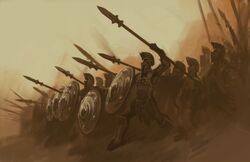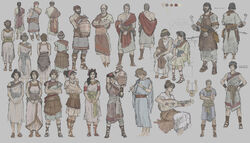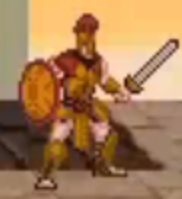(Adding categories) |
|||
| Line 50: | Line 50: | ||
*[[Sparta]] |
*[[Sparta]] |
||
*[[Kratos]] |
*[[Kratos]] |
||
| + | *[[King of Sparta]] |
||
*[[Last Spartan]] |
*[[Last Spartan]] |
||
{{wikipedia|Agoge}} |
{{wikipedia|Agoge}} |
||
Revision as of 08:02, 19 March 2013
| “ | A Spartan never lets his back hit the ground! Even in death, a Spartan stands tall for battle. You are a Spartan, are you not?! | ” |

Spartans, whose army was the main personification of all things Spartan in the God of War universe, were an important part in military history.
Greek History

Spartan civilians.
Both boys and girls were brought up by the city women until the age of seven, when boys (paidia) were taken from their mothers and grouped together in "packs" (agelai) and were sent to what is almost equivalent to present-day military boot camp. This military camp was known as the Agoge. They became inured to hardship, being provided with scant food and clothing; this also encouraged them to steal, and if they were caught, they were punished - not for stealing, but for being caught. There is a characteristic story, told by Plutarch: "The boys make such a serious matter of their stealing, that one of them, as the story goes, who was carrying concealed under his cloak a young fox which he had stolen, suffered the animal to tear out his bowels with its teeth and claws, and died rather than have his theft detected." The boys were encouraged to compete against one another in games and mock fights and to foster an esprit de corps. In addition, they were taught to read and write and learned the songs of Tyrtaios, that celebrated Spartan exploits in the Second Messenian War. They learned to read and write not for cultural reasons, but so they could be able to read military maps. At the age of twelve, a boy was classed as a "youth" (meirakion). His physical education was intensified, discipline became much harsher, and the boys were loaded with extra tasks. The youths had to go barefoot, and were dressed only in a tunic both in summer and in winter.
Adulthood was reached at the age of 18, and the young adult (eiren) initially served as a trainer for the boys. At the same time, the most promising youths were included in the Krypteia. At 20, Spartans became eligible for military service and joined one of the messes (syssitia), which included 15 men of various ages. Those who were rejected retained a lesser form of citizenship, as only the soldiers were ranked among the homoioi. However, even after that, and even during marriage and until about the age of 30, they would spend most of their day in the barracks with their unit. Military duty lasted until the 60th year, but there are recorded cases of older people participating in campaigns in times of crisis.
Throughout their adult lives, the Spartiates continued to be subject to a training regime so strict that, as Plutarch says, "... they were the only men in the world with whom war brought a respite in the training for war." Bravery was the ultimate virtue for the Spartans: Spartan mothers would give their sons the shield with the words "[Return] With it or [carried] on it!" (Ἢ τὰν ἢ ἐπὶ τᾶς), that is to say, either victorious or dead, since in battle, the heavy hoplite shield would be the first thing a fleeing soldier would be tempted to abandon –- rhipsaspia, "dropping the shield", was a synonym for desertion in the field.
In the God of War Series
The Barbarians
Kratos, the main character, is a Spartan hi

Kratos, once a general in the Spartan army.
mself. He grew up in the city, and rose to become its greatest general, leading his fellow Spartans to victory in many battles. Before the events of first game, Kratos led Spartans in battle against the Barbarians of the East, leaded by Alrik. The Spartans were outnumbered and were nearly slaughtered, but Kratos, in a desperate attempt for victory, called the God of War. Ares who crushed the barbarians, allowing the Spartans to win. On this day Kratos became the loyal servant of Ares and sieged city after city in his name. His fellow spartans joined him on these sieges and became almost as ruthless as their general.
Betrayal
Kratos is leading his fellow Spartans in war agains

A Spartan
t an unidentified Greek city. Spartan warriors are often seen seeking help or giving advice to their God, who takes the mortal form and marches alongside them. The Spartans don't fight; they only aid Kratos wherever he needs them.
Ascension
Kratos would seek revenge on Ares and forgivness from the other Gods, he would become their servant. Spartans still loyal to Kratos would aid him and help fend off Persian invaders and other threats. Kratos would begin his labors in order to cleanse his sins.
The Spartans also appear in God of War: Ascension's Multiplayer as one of the teams that a warrior can be assigned to. They fight against the Trojans.
Ghost of Sparta
Spartans, as well as Sparta, are present in the game. Spartan soldiers are encountered numerous times by Kratos, as he makes his way from the sinking city of Atlantis to Sparta. Spartan warriors mostly become the victims of Erinys, the daughter of Thanatos. Kratos meets two dying Spartans on Crete, and later witnesses Erinys killing two more. One of the mortally wounded soldiers receives Kratos' blessing before death. Later, after Erinys' death, Kratos makes his way to Sparta, where a lot of soldiers and civilians are seen, living their everyday lives. Near the Temple of Ares, the Last Spartan is encountered, giving Kratos the Arms of Sparta. Also, in the Jails of Sparta, Kratos meets the Dissenter, a renegade Spartan fanatic of Ares who tried to kill the new God of War. After that, Kratos sets sail with Spartan soldiers to Atlantis. All of the Spartan soldiers with Kratos are killed when their ship is sucked into a whirlpool and thrust within Atlantis, leaving Kratos the sole survivor. Lastly, Kratos encounters the bodies of a few Spartan soldiers in the Mounts of Aroania. Thanatos used one such corpse to speak to Kratos in an attempt to persuade him not to pursue his search. After Kratos defiantly told him that he would seek out his brother no matter what, the soldier's corpse is thrown by Thanatos into a nearby rock wall.
God of War Comics

A Spartan soldier.
In the comics, after Kratos destroyed the Hades Phoenix, a group of Spartans, led by Captain Nikos, were told by the King of Sparta to aid Kratos in finding the Ambrosia for the good of all Sparta. The Spartans aided Kratos in his quest for the Ambrosia, but some were killed after an attack made by Hades, including Nikos. In the battle between Alrik and his Barbarians, the Spartans were attacked by the Arms of Hades, but were abandoned by Kratos, who went to catch up with Alrik, who held the Ambrosia. The Spartans were killed, but in later years, they rose from the dead and battled Kratos, who was on another quest for the Ambrosia, in vengeance. Kratos, however, slew them all.
God of War II
After killing Ares, Kratos became the new God of War. He was worshiped by the Spartans, to whom he become somewhat of an Immortal ruler and commander. Under his reign, they started a great war campaign and conquered many cities and towns, as seen in God of War: Betrayal. However, their campaign came to an end in Rhodes when Zeus attacked Kratos and stripped him of his powers.
As an act of revenge for Kratos' defiance, Zeus soon attacked Sparta itself, destroying the city which already lost the protection of its God. However, after the events on the Island of Creation, Kratos succeeded in slaying the Sisters of Fate and was able to re-write the timeline, defeating Zeus and saving both his godly powers and Sparta.
A notable warrior from the Spartan Army is Kratos' lieutenant, known as the Last Spartan, who plays an important role throughout God of War II.
God of War III
In God of War III, the ideology of the Spartan warrior is used in Kratos' arsenal. For one, his rage meter, Rage of Sparta, is fueled by his rage over the destruction of Sparta and his people by Zeus. With the Blades of Exile equipped, he also obtains a new magic ability called the Army of Sparta. When used, it summons the souls of Spartan warriors which momentarily form a phalanx around Kratos, stab their spears outward, causing serious damage and knocking back any enemies around him, and sending a torrent of arrows from above. Despite having saved his fellow Spartans from certain death by travelling back in time, it is assumed they perished again after Poseidon's death flooded all of Greece but it is possible that some of them survived.
Trivia
- A handful of Spartans in the series are seen wielding bows and arrows as weapons. In reality, Spartans despised the use of arrows, as they thought them to be the weapons of cowards. Instead, these weapons would have been utilized by helots, perioikoi (free non-Spartan residents of Laconia), and mercenaries, rather than Spartan citizens themselves.
- Interestingly, in Ghost of Sparta, there are corpses of Spartan soldiers outside Sparta. They appear to be part of a caravan, probably carrying supplies and goods for trading or merchandise. Kratos finds the bodies after killing Erinys. It is presumed that they were killed by the undead forces which fell victim to Kratos' use of the Scourge of Erinys, or by Erinys herself before she went to the Mounts of Aroania. The latter is quite improbable since she might have attacked Sparta itself should she really be the killer. Either way, no implication is ever given within the game.
- The appearance of Spartans in the God of War comics differ greatly from their in-game counterparts. In the games, they are seen wearing armor, helmets and loincloths while in the comics, they mirror the appearance of Spartans from the movie 300.
- Famous Spartans that are used as characters in God of War: Ascension's multiplayer include Achilles and Leonidas.
Related Pages
| This page uses Creative Commons Licensed content from Wikipedia (view authors). | 
|
Template:Sparta
